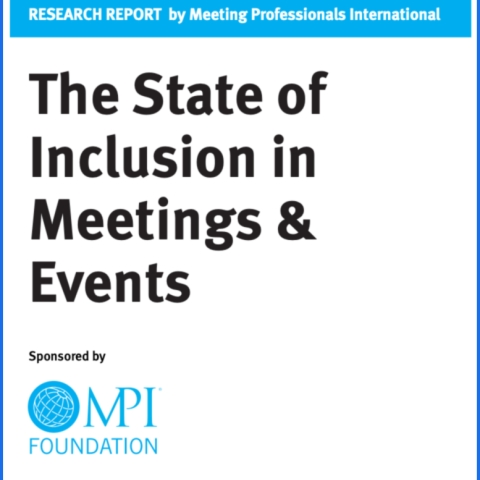MPI Report on Inclusion in Meetings & Events Shows Room for Improvement

The new “State of Inclusion in Meetings & Events” research report from Meeting Professionals International shows that improvement is needed across all facets of event planning. The report discusses how event professionals plan for inclusivity and diversity, highlights knowledge gaps and offers best practices for planners to create inclusive experiences.
Driven by MPI’s inclusion initiative, which involves offering education and tools to make meeting experiences more welcoming, the association partnered with New York University’s Jonathan M. Tisch School of Hospitality to conduct a literature review, research study, interviews and an MPI member survey that garnered 1,087 responses.
Topics covered include ability, culture, demographic characteristics, health, personal characteristics and professional background.
Survey data highlights that the meeting and event industry has traditionally best served extroverts and men — and change is needed. Suggestions to help address this include using technology to allow attendees to ask questions in alternative ways, and having assigned seating for meals.
A common lament is around registration data capture. Keeping a registration form to a reasonable length while still capturing data to foster inclusion is a challenge experienced by many meeting professionals. One best practice, the report suggests, is to create open-ended questions such as “do you have any dietary preferences.”
Report statistics include:
- 20% of respondents said they include diversity and inclusion initiatives to comply with legal requirements and 31% use diversity and inclusion to respond to guest expectations.
- 40% of respondents said they don’t have all the information/knowledge needed to plan inclusive experiences.
- 56% of respondents said their organization has a written diversity and inclusion policy.
Some of the information included seems like common sense — but is often overlooked during the planning process. For example, reserving space for attendees with differing abilities and their guests, or providing them with early access to the space to avoid getting caught in crowds. Sharing event menus in advance. For international audiences, producing event materials in different languages. Even something as simple as offering different seating options or furniture types to meet different attendees’ preferences.
“Industry professionals have said there is a gap in knowledge and education to support the design of inclusive experiences, and MPI takes that seriously,” said Jessie States, director of MPI Academy for Meeting Professionals International. “We need to create safe learning environments wherein our community can learn from the experts and from each other about how to design truly welcoming experiences.”Diverse
MPI is actively working to expand diversity inclusion efforts, including launching a new Inclusive Event Design certificate program. The association has also created special interest groups for its members to connect with like-minded individuals. SIGS include the LGBTQ community, financial and insurance planners, healthcare planners, diversity and inclusion, small business owners and more.
To read the entire MPI “State of Inclusion in Meetings & Events” report, go HERE.
Don't miss any event-related news: sign up for our weekly e-Newsletter HERE and engage with us on Twitter, Facebook, LinkedIn and Instagram!


Add new comment